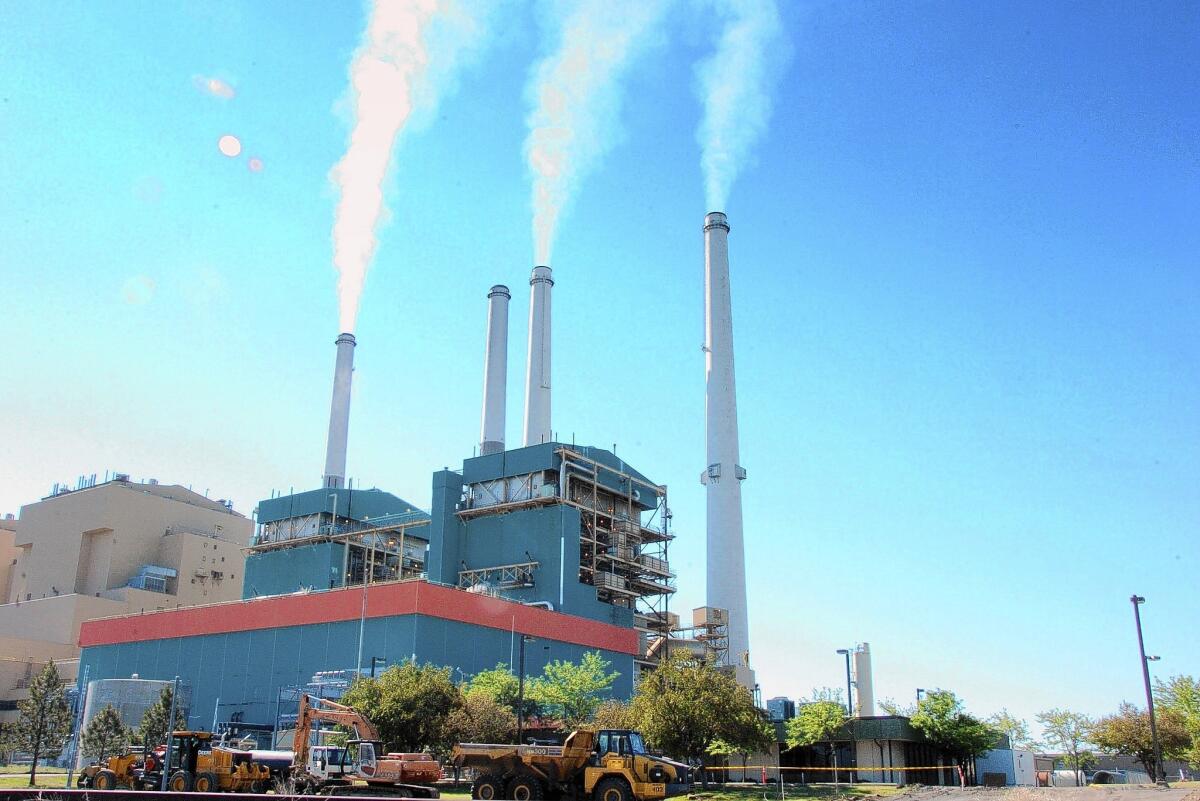Obama’s economic advisors warn against delays on greenhouse gases

- Share via
Reporting from washington — Delaying action on cutting greenhouse gas emissions that drive climate change could damage the U.S. economy, according to a report to be issued Tuesday by the White House’s Council of Economic Advisers.
The council estimated that the eventual cost of cutting emissions will increase about 40% for every decade of delay because remediation measures will be more stringent — and more costly — as carbon dioxide concentrations in the atmosphere grow.
The report’s timing is meant to bolster the case for the Obama administration’s recent push to implement its climate change agenda, including a controversial rule proposed last month by the Environmental Protection Agency to cut emissions from existing power plants.
The EPA will hold a series of hearings around the country this week to get public comment about the rule, much of it sure to be critical of the costs of complying with the new rule.
The report acknowledges that efforts to cut emissions would entail short-term costs, but it considers them an investment against far higher outlays in the future. Climate change spurred by the combustion of fossil fuels already has begun to make its mark on the economy, the White House and independent experts said.
Droughts are expected to become more frequent and intense, for example. This year, the California drought is estimated to cost the state nearly $2 billion and 14,500 jobs, according a May study from UC Davis.
Increased acidification of the ocean also threatens oyster beds in the Pacific Northwest. And sea-level rise has led to a greater incidence of flooding in many coastal towns.
The cumulative effect of warming temperatures and ozone pollution could reduce the yield of staple grains, such as wheat and corn, just as growing populations demand more food, concluded a study published Monday in the journal Nature Climate Change.
The Obama administration has introduced initiatives every few weeks since the start of the year to underscore a reset of climate policy that the president articulated in a June 2013 speech.
The fossil fuel industry and its congressional allies have argued that the measures are onerous. But some environmental watchdogs contend that the administration has policies in place that undercut its efforts to reduce greenhouse gas emissions, most notably its system of leasing federal lands for coal mining.
Under President Obama, the Interior Department has leased 2.2 billion tons of coal, nearly all of it from federal lands in Wyoming’s Powder River basin, according to a report issued Monday by Greenpeace. The coal accounts for 3.9 billion metric tons of carbon pollution, the group estimated, “more than the 3.7 billion tons that was emitted in the entire European Union in 2012.”
The federal coal leasing program has long been troubled. The agency’s inspector general and the Government Accountability Office issued reports over the last year that criticized the Interior Department’s Bureau of Land Management for selling leases at low prices, shortchanging taxpayers by tens of millions of dollars.
Using the administration’s own estimate for the “social cost of carbon,” or the damage carbon dioxide does to the public health and the economy, at $37 a ton, Greenpeace estimated that “coal leased during the Obama administration will cause damages estimated between $52 billion and $530 billion.” In contrast, Greenpeace said, the total amount of revenue generated from those coal lease sales was $2.3 billion.
Coal exports from the U.S. to Europe have increased recently, driven in part by the low price of American coal.
“The cheap coal made available by the federal coal leasing program has encouraged increased coal consumption in the United States for decades, at the expense of cleaner forms of energy,” the report said. “Combined with the U.S. coal industry’s efforts to boost exports, subsidized U.S. coal could have a similar impact abroad, undermining global efforts to reduce carbon pollution.”
The report called for the Interior Department to review and place a moratorium on the federal coal leasing program in order to understand the role it plays in stoking greenhouse gas emissions at home and abroad.
More to Read
Inside the business of entertainment
The Wide Shot brings you news, analysis and insights on everything from streaming wars to production — and what it all means for the future.
You may occasionally receive promotional content from the Los Angeles Times.











